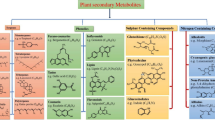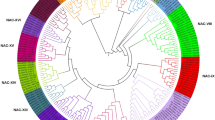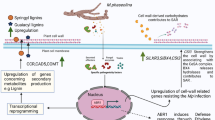Abstract
Plant defensins and lipid transfer proteins (LTPs) constitute a large and evolutionarily diverse family of antimicrobial peptides. Defensins and LTPs are two pathogenesis-related proteins (PR proteins) whose characterization may help to uncover aspects about the sugarcane response to pathogens attack. LTPs have also been investigated for their participation in the response to different types of stress. Despite the important roles of defensins and LTPs in biotic and abiotic stresses, scarce knowledge is found about these proteins in sugarcane. By using bioinformatics approaches, we characterized defensins and LTPs in the sugarcane wild species and modern cultivar genomes. The identification of defensins and LTPs showed that all five defensins groups and eight of the nine LTPs have their respective genes loci, although some was only identified in the cultivar genome. Phylogenetic analysis showed that defensins appear to be more conserved among groups of plants than LTPs. Some defensins and LTPs showed opposite expression during pathogenic and benefic bacterial interactions. Interestingly, the expression of defensins and LTPs in shoots and roots was completely different in plants submitted to benefic bacteria or water depletion. Finally, the modeling and comparison of isoforms of LTPs and defensins in wild species and cultivars revealed a high conservation of tertiary structures, with variation of amino acids in different regions of proteins, which could impact their antimicrobial activity. Our data contributed to the characterization of defensins and LTPs in sugarcane and provided new elements for understanding the involvement of these proteins in sugarcane response to different types of stress.








Similar content being viewed by others

References
Altschul SF, Gish W, Miller W et al (1990) Basic local alignment search tool. J Mol Biol 215:403–410. https://doi.org/10.1016/S0022-2836(05)80360-2
Babicki S, Arndt D, Marcu A et al (2016) Heatmapper: web-enabled heat mapping for all. Nucleic Acids Res 44:W147–W153. https://doi.org/10.1093/nar/gkw419
Belarmino LC, Capriles PVSZ, Crovella S et al (2010) EST-database search of plant defensins—an example using sugarcane, a large and complex genome. Curr Protein Pept Sci 11:248–254. https://doi.org/10.2174/138920310791112048
Betts MJ, Russell RB (2003) Amino acid properties and consequences of substitutions. In: Bioinformatics for geneticists. pp 289–316
Boutrot F, Chantret N, Gautier MF (2008) Genome-wide analysis of the rice and arabidopsis non-specific lipid transfer protein (nsLtp) gene families and identification of wheat nsLtp genes by EST data mining. BMC Genomics 9:1–19. https://doi.org/10.1186/1471-2164-9-86
Bowles DJ (1990) Defense-related proteins in higher plants. Annu Rev Biochem 59:873–907. https://doi.org/10.1126/science.245.4922.1100
Broekaert WF, Parijs Van J, Leyns F et al (1989) A chitin-binding lectin from stinging nettle rhizomes with antiftungal properties. Science 80(245):1100–1102. https://doi.org/10.1126/science.245.4922.1100
Chen Y, Ma J, Zhang X et al (2017) A novel non-specific lipid transfer protein gene from sugarcane (NsLTPs), obviously responded to abiotic stresses and signaling molecules of SA and MeJA. Sugar Tech 19:17–25. https://doi.org/10.1007/s12355-016-0431-4
Clamp M, Cuff J, Searle SM, Barton GJ (2004) The Jalview Java alignment editor. Bioinformatics 20:426–427. https://doi.org/10.1093/bioinformatics/btg430
Colilla FJ, Rocher A, Mendez E (1990) gamma-Purothionins: amino acid sequence of two polypeptides of a new family of thionins from wheat endosperm. FEBS Lett 270:191–194. https://doi.org/10.1016/0014-5793(90)81265-P
Conrath U (2006) Systemic Acquired Resistance Plant Signal Behav 4:179–184. https://doi.org/10.4161/psb.1.4.3221
Crooks G, Hon G, Chandonia J, Brenner S (2004) WebLogo: A sequence logo generator gavin. Genome Res 14:1188–1190. https://doi.org/10.1101/gr.849004.1
De-Paula VS, Razzera G, Medeiros L et al (2008) Evolutionary relationship between defensins in the Poaceae family strengthened by the characterization of new sugarcane defensins. Plant Mol Biol 68:321–335. https://doi.org/10.1007/s11103-008-9372-y
DeBono A, Yeats TH, Rose JKC et al (2009) Arabidopsis LTPG is a glycosylphosphatidylinositol-anchored lipid transfer protein required for export of lipids to the plant surface. Plant Cell Online 21:1230–1238. https://doi.org/10.1105/tpc.108.064451
DeLano WL (2002) PyMOL: an open-source molecular graphics tool. Ccp4 Newslett Protein Crystallogr 40:82–92
Dias RDO, Franco OL (2015) Cysteine-stabilized αβ defensins: from a common fold to antibacterial activity. Peptides 72:64–72. https://doi.org/10.1016/j.peptides.2015.04.017
Dodds PN, Rathjen JP (2010) Plant immunity: towards an integrated view of plant–pathogen interactions. Nat Rev Genet 11:539–548. https://doi.org/10.1038/nrg2812
Edgar RC (2004) MUSCLE: Multiple sequence alignment with high accuracy and high throughput. Nucleic Acids Res 32:1792–1797. https://doi.org/10.1093/nar/gkh340
Edreva A (2005) Pathogenesis-related proteins : research progress in the last 15 years. Gen Appl Plant Physiol 31:105–124
Edstam MM, Viitanen L, Salminen TA, Edqvist J (2011) Evolutionary history of the non-specific lipid transfer proteins. Mol Plant 4:947–964. https://doi.org/10.1093/mp/ssr019
Finkina EI, Melnikova DN, Bogdanov IV, Ovchinnikova TV (2016) Lipid transfer proteins as components of the plant innate immune system: structure, functions, and applications. Acta Naturae 8:47–61
Frost CJ, Mescher MC, Carlson JE, De Moraes CM (2008) Plant defense priming against herbivores: getting ready for a different battle. Plant Physiol 146:818–824. https://doi.org/10.1104/pp.107.113027
Gasteiger E, Gattiker A, Hoogland C et al (2003) ExPASy: the proteomics server for in-depth protein knowledge and analysis. Nucleic Acids Res 31:3784–3788. https://doi.org/10.1093/nar/gkg563
Gizatullina AK, Finkina EI, Mineev KS et al (2013) Recombinant production and solution structure of lipid transfer protein from lentil Lens culinaris. Biochem Biophys Res Commun 439:427–432. https://doi.org/10.1016/j.bbrc.2013.08.078
Grabowski M, Joachimiak A, Otwinowski Z, Minor W (2007) Structural genomics: keeping up with expanding knowledge of the protein universe. Curr Opin Struct Biol 17(347–353):1. https://doi.org/10.1016/j.sbi.2007.06.003
Grativol C, Regulski M, Bertalan M et al (2014) Sugarcane genome sequencing by methylation filtration provides tools for genomic research in the genus Saccharum. Plant J 79:162–172. https://doi.org/10.1111/tpj.12539
Hall TA (1999) BioEdit: a user-friendly biological sequence alignment editor and analysis program for Windows 95/98/NT. Nucleic Acids Symp Ser 41:95–98. https://doi.org/10.14601/Phytopathol_Mediterr-14998u1.29
Heil M, Bostock RM (2002) Induced systemic resistance (ISR) against pathogens in the context of induced plant defences. Ann Bot 89:503–512. https://doi.org/10.1093/aob/mcf076
Hollingsworth SA, Karplus PA (2010) A fresh look at the Ramachandran plot and the occurrence of standard structures in proteins. Biomol Concepts 1:271–283. https://doi.org/10.1515/bmc.2010.022
Jang CS, Yim WC, Moon JC et al (2008) Evolution of non-specific lipid transfer protein (nsLTP) genes in the Poaceae family: their duplication and diversity. Mol Genet Genomics 279:481–497. https://doi.org/10.1007/s00438-008-0327-4
Janssen BJC, Schirra HJ, Lay FT et al (2003) Structure of Petunia hybrida defensin 1, a novel plant defensin with five disulfide bonds. Biochemistry 42:8214–8222. https://doi.org/10.1021/bi034379o
Kader J-C (1996) Lipid transfer proteins in plants. Plant Physiol 47:627–654. https://doi.org/10.1146/annurev.arplant.47.1.627
Kelley LA, Mezulis S, Yates CM et al (2015) The Phyre2 web portal for protein modelling, prediction and analysis. Nat Protoc 10:845–858. https://doi.org/10.1038/nprot.2015.053
Kim H, Lee SB, Kim HJ et al (2012) Characterization of glycosylphosphatidylinositol-anchored lipid transfer protein 2 (LTPG2) and overlapping function between LTPG/LTPG1 and LTPG2 in cuticular wax export or accumulation in Arabidopsis thaliana. Plant Cell Physiol 53:1391–1403. https://doi.org/10.1093/pcp/pcs083
Kumar S, Stecher G, Tamura K (2016) MEGA7: molecular evolutionary genetics analysis version 7.0 for bigger datasets. Mol Biol Evol 33:1870–1874. https://doi.org/10.1093/molbev/msw054
Lacerda AF, Vasconcelos ÉAR, Pelegrini PB, Grossi de Sa MF (2014) Antifungal defensins and their role in plant defense. Front Microbiol 5:1–10. https://doi.org/10.3389/fmicb.2014.00116
Langmead B, Salzberg SL (2012) Fast gapped-read alignment with Bowtie 2. Nat Methods 9:357–359. https://doi.org/10.1038/nmeth.1923
Laskowski RA (2001) PDBsum: summaries and analyses of PDB structures. Nucleic Acids Res 29:221–222. https://doi.org/10.1093/nar/29.1.221
Lay F, Anderson M (2005) Defensins—components of the innate immune system in plants. Curr Protein Pept Sci 6:85–101. https://doi.org/10.2174/1389203053027575
Lee JY, Min K, Cha H et al (1998) Rice non-specific lipid transfer protein: the 1.6 Å crystal structure in the unliganded state reveals a small hydrophobic cavity. J Mol Bio 276:437–448. https://doi.org/10.1006/jmbi.1997.1550
Li J, Gao G, Xu K et al (2014) Genome-wide survey and expression analysis of the putative non-specific lipid transfer proteins in Brassica rapa L. PLoS ONE 9:e84556. https://doi.org/10.1371/journal.pone.0084556
Liu F, Zhang X, Lu C et al (2015) Non-specific lipid transfer proteins in plants: presenting new advances and an integrated functional analysis. J Exp Bot 66:5663–5681. https://doi.org/10.1093/jxb/erv313
Lokko Y, Anderson JV, Rudd S et al (2007) Characterization of an 18,166 EST dataset for cassava (Manihot esculenta Crantz) enriched for drought-responsive genes. Plant Cell Rep 26:1605–1618. https://doi.org/10.1007/s00299-007-0378-8
Mendez E, Moreno A, Colilla F et al (1990) Primary structure and inhibition of protein synthesis in eukaryotic cell-free system of a novel thionin, y-hordothionin, from barley endosperm. Eur J Biochem 539:533–539. https://doi.org/10.1111/j.1432-1033.1990.tb15649.x
Oloriz MI, Gil V, Rojas L et al (2012) Sugarcane genes differentially expressed in response to Puccinia melanocephala infection: identification and transcript profiling. Plant Cell Rep 31:955–969. https://doi.org/10.1007/s00299-011-1216-6
Parisi K, Shafee TMA, Quimbar P et al (2018) The evolution, function and mechanisms of action for plant defensins. Semin Cell Dev Biol 88:107–118. https://doi.org/10.1016/j.semcdb.2018.02.004
Pettersen EF, Goddard TD, Huang CC et al (2004) UCSF Chimera—a visualization system for exploratory research and analysis. J Comput Chem 25:1605–1612. https://doi.org/10.1002/jcc.20084
Rambaut A (2016) FigTree v1.4.3. Institute of Evolutionary Biology, University of Edinburgh, Edinburgh. http://tree.bio.ed.ac.uk/software/figtree/
Rodrigues FA, Da Graça JP, De Laia ML et al (2011) Sugarcane genes differentially expressed during water deficit. Biol Plant 55:43–53. https://doi.org/10.1007/s10535-011-0006-x
Rombel IT, Sykes KF, Rayner S, Johnston SA (2002) ORF-FINDER: a vector for high-throughput gene identification. Gene 282:33–41. https://doi.org/10.1016/s0378-1119(01)00819-8
Ryals JA, Neuenschwander UH, Willits MG et al (1996) Systemic acquired resistance. Plant Cell 8:1809–1819. https://doi.org/10.1105/tpc.8.10.1809
Safi H, Saibi W, Alaoui MM et al (2015) A wheat lipid transfer protein (TdLTP4) promotes tolerance to abiotic and biotic stress in Arabidopsis thaliana. Plant Physiol Biochem 89:64–75. https://doi.org/10.1016/j.plaphy.2015.02.008
Salcedo G, Sánchez-Monge R, Barber D, Díaz-Perales A (2007) Plant non-specific lipid transfer proteins: an interface between plant defence and human allergy. Biochim Biophys Acta 1771:781–791. https://doi.org/10.1016/j.bbalip.2007.01.001
Salminen TA, Blomqvist K, Edqvist J (2016) Lipid transfer proteins: classification, nomenclature, structure, and function. Planta 244:971–997. https://doi.org/10.1007/s00425-016-2585-4
Santa Brigida AB, Rojas CA, Grativol C et al (2016) Sugarcane transcriptome analysis in response to infection caused by Acidovorax avenae subsp. avenae. PLoS One 11:e0166473. https://doi.org/10.1371/journal.pone.0166473
Schaaper WMM, Posthuma GA, Meloen RH et al (2001) Synthetic peptides derived from the β2-β3 loop of Raphanus sativus antifungal protein 2 that mimic the active site. J Pept Res 57:409–418. https://doi.org/10.1034/j.1399-3011.2001.00842.x
Shahzad Z, Ranwez V, Fizames C et al (2013) Plant defensin type 1 (PDF1): protein promiscuity and expression variation within the Arabidopsis genus shed light on zinc tolerance acquisition in Arabidopsis halleri. New Phytol 200:820–833. https://doi.org/10.1111/nph.12396
Sher Khan R, Iqbal A, Malak R et al (2019) Plant defensins: types, mechanism of action and prospects of genetic engineering for enhanced disease resistance in plants. 3 Biotech 9:112. https://doi.org/10.1007/s13205-019-1725-5
Shin DH, Lee JY, Hwang KY et al (1995) High-resolution crystal structure of the non-specific lipid-transfer protein from maize seedlings. Structure 3:189–199. https://doi.org/10.1016/s0969-2126(01)00149-6
Silverstein KAT, Moskal-Junior WA, Wu HC et al (2007) Small cysteine-rich peptides resembling antimicrobial peptides have been under-predicted in plants. Plant J 51:262–280. https://doi.org/10.1111/j.1365-313X.2007.03136.x
Souza TP, Dias RO, Silva-Filho MC (2017) Defense-related proteins involved in sugarcane responses to biotic stress. Genet Mol Biol 40:360–372. https://doi.org/10.1590/1678-4685-gmb-2016-0057
Trifinopoulos J, Nguyen LT, von Haeseler A, Minh BQ (2016) W-IQ-TREE: a fast online phylogenetic tool for maximum likelihood analysis. Nucleic Acids Res 44:W232–W235. https://doi.org/10.1093/nar/gkw256
van der Weerden NL, Anderson MA (2013) Plant defensins: common fold, multiple functions. Fungal Biol Rev 26:121–131. https://doi.org/10.1016/j.fbr.2012.08.004
van Ree R (2002) Clinical importance of non-specific lipid transfer proteins as food allergens. Biochem Soc Trans 30:910–913. https://doi.org/10.1042/bst0300910
Vargas L, Brígida ABS, Mota Filho JP et al (2014) Drought tolerance conferred to sugarcane by association with Gluconacetobacter diazotrophicus: a transcriptomic view of hormone pathways. PLoS ONE 9:1–37. https://doi.org/10.1371/journal.pone.0114744
Wang HW, Hwang S-G, Karuppanapandian T et al (2012) Insight into the molecular evolution of non-specific lipid transfer proteins via comparative analysis between rice and sorghum. DNA Res 19:179–194. https://doi.org/10.1093/dnares/dss003
Waterhouse AM, Procter JB, Martin DMA et al (2009) Jalview Version 2-a multiple sequence alignment editor and analysis workbench. Bioinformatics 25:1189–1191. https://doi.org/10.1093/bioinformatics/btp033
Wei K, Zhong X (2014) Non-specific lipid transfer proteins in maize. BMC Plant Biol 14:281–298. https://doi.org/10.1186/s12870-014-0281-8
Woytowich AE, Khachatourians GG (2001) Plant antfungal peptides and their use in transgenic food crops. Appl Mycol Biotechnol 1:145–164. https://doi.org/10.1016/S1874-5334(01)80008-3
Yang YF, Cheng KC, Tsai PH et al (2009) Alanine substitutions of noncysteine residues in the cysteine-stabilized αβ motif. Protein Sci 18:1498–1506. https://doi.org/10.1002/pro.164
Yeats TH, Rose JKC (2008) The biochemistry and biology of extracellular plant lipid-transfer proteins (LTPs). Protein Sci 17:191–198. https://doi.org/10.1110/ps.073300108
Yount NY, Yeaman MR (2004) Multidimensional signatures in antimicrobial peptides. Proc Natl Acad Sci U S A 101:7363–7368. https://doi.org/10.1073/pnas.0401567101
Zhang J, Zhang X, Tang H et al (2018) Allele-defined genome of the autopolyploid sugarcane Saccharum spontaneum L. Nat Genet 50:1565–1573. https://doi.org/10.1038/s41588-018-0237-2
Acknowledgements
The authors thank Prof. Paulo Cavalcanti Gomes Ferreira, Laboratório de Biologia Molecular de Plantas, Instituto de Bioquímica Médica, Universidade Federal do Rio de Janeiro, for providing the sugarcane RNA-seq libraries used for the identification of defensins and LTPs isoforms.
Funding
This work was supported by Fundação de Apoio à Pesquisa no Estado do Rio de Janeiro (FAPERJ) and Coordenação de Aperfeiçoamento de Pessoal de Nível Superior—Brasil (CAPES)—FinanceCode 001.
Author information
Authors and Affiliations
Contributions
Conceptualization, CG; formal analysis, LOS and CG; writing—original draft preparation, LOS and CG; writing—review and editing, CG; VMG; LOS; LSP; JLP; supervision, CG. All authors contributed to the discussion of the results, reviewed the manuscript, and approved the final manuscript. All authors have read and agreed to the published version of the manuscript.
Corresponding author
Ethics declarations
Conflict of interest
The authors declare no competing interests.
Disclaimer
The funding bodies had no role in the design of the study, data analysis interpretation, and writing of the manuscript.
Additional information
Publisher's note
Springer Nature remains neutral with regard to jurisdictional claims in published maps and institutional affiliations.
Supplementary Information
Below is the link to the electronic supplementary material.
Rights and permissions
About this article
Cite this article
de Oliveira Silva, L., da Silva Pereira, L., Pereira, J.L. et al. Divergence and conservation of defensins and lipid transfer proteins (LTPs) from sugarcane wild species and modern cultivar genomes. Funct Integr Genomics 22, 235–250 (2022). https://doi.org/10.1007/s10142-022-00832-0
Received:
Revised:
Accepted:
Published:
Issue Date:
DOI: https://doi.org/10.1007/s10142-022-00832-0



